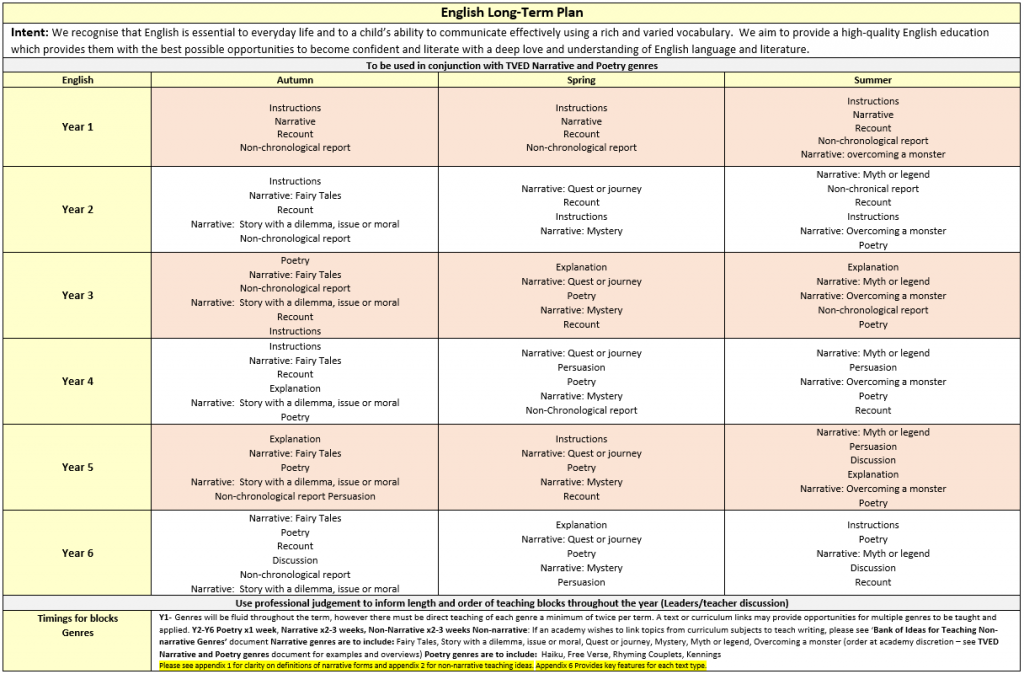Intent
At TVED, we strive to help our children develop into articulate and imaginative communicators, who are well-equipped with the basic skills they need to become life-long learners and have a positive impact on our community and industry at the heart of our area; English learning is key in this. We aim to ensure all of our children develop a genuine love of language and the written word, through a text-based approach; this links closely to the way we teach reading, as the text that we use in writing lessons, where possible, is a similar text to the one that we use in our Reading Comprehension sessions so that children are able to contextualise and apply their learning.
Careful links are made across the curriculum to ensure that children’s English learning is relevant and meaningful: where possible making links between reading and writing but also with the wider curriculum and world. We ensure that children develop an understanding of how writing is used in everyday life and, therefore, how important and useful the skills are that they are learning. Our intentions in writing are for children to:
Implementation
Our TVED curriculum is shaped by the ethos ‘We are what we repeatedly do, excellence therefore is not an act but a habit’ which aims to enable all children, regardless of ability, additional needs or levels of disadvantage to flourish to become the very best version of themselves they can possibly be.
We teach the National Curriculum, supported by a clear skills and knowledge progression document which can be seen below. This ensures that skills and knowledge are built on year by year and sequenced appropriately to maximise learning for all children regardless of age, phase and stage. We aim to develop children’s ability to produce well-structured, detailed writing in which the meaning is made clear and which engages the interest of the audience / reader. Particular attention is paid throughout the school to the formal structures of English: grammatical detail, punctuation and spelling. Teachers clearly model writing skills and document the learning journey through visible displays and supported by our curriculum golden thread: vocabulary; guided writing sessions are used to target specific needs of groups and individuals and provide high quality models and expectations for writing. Children have opportunities to write at length, in extended, independent writing sessions at the end of a unit of work – applying their taught skills to an independent piece of writing.
Throughout the Early Years, Key Stage 1 and Key Stage 2, we teach writing through a text-based approach, which allows us to meet the needs of the children that we are teaching – through choosing a text that will engage, inspire and motivate. As well as reading a wide variety of texts, children are given frequent opportunities to develop their writing skills in different genre and forms. Children will experience a balance of narrative and non-narrative in each term and will revisit text types in subsequent year groups to allow for spaced retrieval and to embed the science of learning and cognitive theory within all that they do.
Across the full Primary age range, the writing framework should be tailored to meet the needs of all pupils relative to age, stage and phase. At Tees Valley Education this incorporates our Formal, Semiformal+ and Semiformal curriculum pathways, teachers should tailor the teaching blocks and framework to suit the needs of the children within these pathways.
Pupils are taught punctuation and grammar skills in both discrete sessions as well as within contextualised grammar sessions within each block of writing, this allows them to learn new and practice existing skills, whilst also embedding these within the writing taking place. Children then apply the grammar and punctuation skills that they have learnt in their extended pieces of writing.
Impact
By the time they leave our academies, children will have developed the skills and knowledge necessary to allow them to:
Children will leave TVED competent and confident writers who have not only been immersed in a wide range of genre and forms in both narrative and non-narrative but who know the real world application of the work they are doing. They will have been given the opportunities, experiences and audiences to develop an in depth knowledge of Primary writing and the impact written language can have on the wider world around them.
